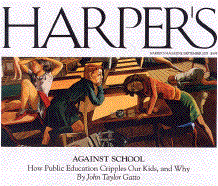Short, but worth the read from The New York Times on-going column 'The Stone':
Why I Do I Teach?
Shakespeare vs. menus: The battle over public school reading lists.
Welcome! Venite...Studete...Discite is the Professional Development Committee blog for Blair Academy. We hope that the blog will serve as a valuable professional development resource for all members of the Blair Academy faculty & staff and foster discussion, exploration, disagreement, collaboration, and most importantly, help each member of the Blair Faculty grow professionally and help us all serve our students better both inside and outside of the classroom.


 In thinking about our first PDC Thursday Discussion tomorrow evening, I've been reading Alfie Kohn's most recent book -- Feel-Bad Education. This collection of essays are a wonderful introduction to Mr. Kohn's thinking and approach to education, and I've found a number of things that really strike me as significant. It is definitely worth taking a look! The library copy will be back on the shelf later this week...
In thinking about our first PDC Thursday Discussion tomorrow evening, I've been reading Alfie Kohn's most recent book -- Feel-Bad Education. This collection of essays are a wonderful introduction to Mr. Kohn's thinking and approach to education, and I've found a number of things that really strike me as significant. It is definitely worth taking a look! The library copy will be back on the shelf later this week...

"We too are culturally myopic and often forget that we represent not the absolute wave of history but merely a worldview, and that modernity -- whether you identify it by the monikers westernization, capitalism, democracy, or free trade -- is but an expression of our cultural values. It is not some objective force removed from the constrains of culture. And it is certainly not the true and only pulse of history" (p 193).
From the Joint Declaration of the Mamos of the Sierra Nevadas:
"Who will pay the universal mother for the air we breathe, the water that flows, the light of the sun? Everything that exists has a spirit that is sacred and must be respected. Our law is the Law of Origins, the Law of Life. We invite all the Younger Brothers to be guardians of life. We affirm our promise to the Mother, and issue a call for solidarity and unity for all peoples and all nations" (p 147).
